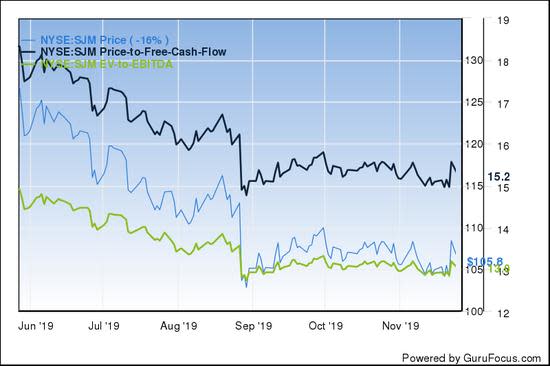JM Smucker: Not a Very Delicious Snack After All
The U.S. food industry is considered to be one of the best-performing spaces, with a majority of the listed companies' stocks having performed exceedingly well in 2019. It is actually surprising to see that most of the companies within this space on the S&P 500 appear in green when one checks the year-to-date share performance, and it is evident that the industry has been a favorite among investors. There continue to be some exceptions, however, in the form of companies operating in weaker categories that are unable to grow their top-line and that are quickly sidelined by food investors. JM Smucker Co. (NYSE:SJM) is a good example of such a company that is struggling in a growing industry.
Why is growth becoming so difficult?
JM Smucker engages in the manufacturing and marketing of branded food and beverage products for consumers as well as pets. It has a wide, multi-channel global distribution and supplies its branded products to consumer goods retailers, pet stores, wholesalers, pharmacies, discount stores, distribution centers, restaurants and various other points of sale.
While the company has a vast range of stock keeping units across different categories that cater to a wide variety of consumer groups, the harsh reality is that the space is highly competitive in nature. Other incumbents like Kraft Heinz (NASDAQ:KHC) and Campbell Soup (NYSE:CPB) are also struggling with sustainable revenue growth. There is a strong competition from retailers like Walmart (NYSE:WMT) that are pushing their private labels over the products of these manufacturers. This has resulted in immense pricing pressure on companies like Smucker, which has impacted top-line growth.
Mixed results with some leeway for acquisitions
Last week, the company managed to deliver another quarter of mixed results when its reported revenue of $1.96 billion was marginally below analysts' expectations of $1.97 billion. Despite all the pricing pressure, Smucker delivered earnings of $2.26 per share, well above the analyst consensus estimate of $2.13. Management's recent divestment of the U.S. baking business has reduced the company's top line, but has also provided the team with surplus funds for carrying out more acquisitions. These acquisitions are key as the company's Retail Coffee and Retail Consumer Food segments in the U.S. are suffering from low prices, making product diversification an absolute necessity.
Acquisition-led growth and new brands
Smucker is dealing with the current situation of lower product prices through cost optimization and inorganic growth. With respect to the former, the company did achieve some success through its right-spend program that seemingly delivered cost savings of $30 million in 2019.
As for the latter, CEO Mark T. Smucker has focused on an acquisition-led growth strategy like many of the company's peers, particularly Kraft Heinz (NASDAQ:KHC). The company acquired Ainsworth, Big Heart Pet Brand, Sahale Snacks and Enray to boost its Retail Pet Foods and Retail Consumer Foods segments. Rowland Coffee is an interesting addition to the company's portfolio of coffee products.
Apart from this, management has entered into strategic partnerships with the likes of Keurig Dr Pepper (NYSE:KDP) and Dunkin' Brands (NASDAQ:DNKN) to market its highly successful K-Cup category of products. Their new Folgers brand is also an outperformer within this category.
The company has also launched new products for the Nutrish and Milk-Bone brands in the Retail Pet Food segment. Both grew at around 4%, providing some encouragement to the management team. However, all this has done little to boost the optimism of the market.
Why isn't the stock witnessing a breakout?

As per the above price chart, JM Smucker has lost about 16% of its value over the past six months, and the stock has been more or less flat over the past couple of months. The biggest question is: Why isn't the stock witnessing a breakout and moving past its resistance level of $110? There has been a steady contraction of the valuation multiples along with the price, which implies that while the company's results may have been more or less steady after all the M&A activity and cost controls, the market perception has clearly taken a beating. Evidently, there is no real short-term catalyst to boost the price and the stock might continue to follow the same laggard path as Kraft Heinz with no hope in sight.
Management's efforts may not be enough
Every investor has the concrete objective of holding on to a stock. When a company stops showing appreciation and operates in a price-constrained, competitive market where incumbents are also struggling, it is clearly not a good sign.
Smucker's management team deserves credit for attempting to stabilize the top line through quality acquisitions and pushing up margins. The dividend yield of 3.25% is also quite decent. However, the declining market perception of the company and the absence of any near-term catalysts in favor of the company or the U.S. food and snacks market in general are good enough reasons for investors to avoid the stock.
Disclosure: No positions.
Read more here:
Not a Premium Member of GuruFocus? Sign up for a free 7-day trial here.
This article first appeared on GuruFocus.
